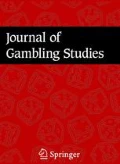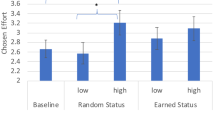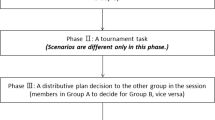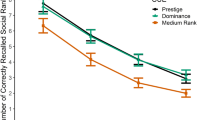Abstract
Through a series of three experiments, this study explored the possible influence of social class on the decision-making tendency of prestige-seeking in a Prestige-Money Game, and further explored the internal sources of such influence. In Experiment 1, the participants’ social class was manipulated to examine whether there were class effects in prestige-seeking when individuals of different social classes were paired together in a Prestige-Money Game. In Experiment 2, social rank, which only contained ranking differences, was adopted as a more abstract proxy variable for social class to investigate whether class effects still existed in prestige-seeking in a Prestige-Money Game. Based on the results of Experiment 1 and 2, Experiment 3 further explored the sources of motivation for prestige-seeking among subjects of different social class. The results showed that upper-class individuals showed greater money-seeking tendencies when facing an upper-class opponent, and showed greater prestige-seeking tendencies when facing a lower-class opponent. Such tendencies were derived from social rank; instrumental value played a substantial role. The game strategy of lower-class individuals were mainly oriented toward their personal needs. Specifically, they showed greater prestige-seeking when facing an upper-class opponent, and showed greater money-seeking when facing a lower-class opponent. Such tendencies were derived from the activation of their social class identity; the role of instrumental value was limited. These findings suggest that the essential differences in the game tendencies of individuals from different social classes in a Prestige-Money Game may originate from the fact that different social classes have different demands for the instrumental value and social value of prestige.





Similar content being viewed by others
Change history
09 April 2019
The original version of this article contained an error in the co-author name and e-mail address. The author name should read as ���Chen-Hao Tan��� instead of ���Cheng-Hao Tang���.
References
Anderson, C., Hildreth, J. A. D., & Howland, L. (2015). Is the desire for status a fundamental human motive? A review of the empirical literature. Psychological Bulletin, 141(3), 574–601.
Anderson, C., Kraus, M. W., Galinsky, A. D., & Keltner, D. (2012). The local-ladder effect social status and subjective well-being. Psychological Science, 23(7), 764–771.
Boksem, M. A., Kostermans, E., Milivojevic, B., & De Cremer, D. (2012). Social status determines how we monitor and evaluate our performance. Social Cognitive and Affective Neuroscience, 7(3), 304–313.
Chen, X., & Li, S. (2005). Cross-national differences in cooperative decision-making in mixed-motive business contexts: The mediating effect of vertical and horizontal individualism. Journal of International Business Studies, 36(6), 622–636.
Cheng, J. T., & Tracy, J. L. (2013). The impact of wealth on prestige and dominance rank relationships. Psychological Inquiry, 24(2), 102–108.
Cheng, J. T., Tracy, J. L., & Anderson, C. (2014). The psychology of social status. Berlin: Springer.
Chenhao, T., Yibo, W., Yichen, C., & Pei, W. (2016). The profit sacrificing tendency of reputation-profit game. Advances in Psychological Science, 24(12), 1907–1916.
Côté, S., Piff, P. K., & Willer, R. (2013). For whom do the ends justify the means? Social class and utilitarian moral judgment. Journal of Personality and Social Psychology, 104(3), 490–503.
Dubois, D., Rucker, D. D., & Galinsky, A. D. (2012). Super size me: Product size as a signal of status. Journal of Consumer Research, 38(6), 1047–1062.
Dubois, D., Rucker, D. D., & Galinsky, A. D. (2015). Social class, power, and selfishness: When and why upper and lower class individuals behave unethically. Journal of Personality and Social Psychology, 108(3), 436–449.
Fast, N. J., Halevy, N., & Galinsky, A. D. (2012). The destructive nature of power without status. Journal of Experimental Social Psychology, 48(1), 391–394.
Fiske, S. T. (2013). What’s in a theory of rank? Psychological Inquiry, 24(2), 109–111.
Galak, J., Gray, K., Elbert, I., & Strohminger, N. (2016). Trickle-down preferences: Preferential conformity to high status peers in fashion choices. PLoS ONE, 11(5), e153448.
Galinsky, A. D., Magee, J. C., Inesi, M. E., & Gruenfeld, D. H. (2006). Power and perspectives not taken. Psychological Science, 17(12), 1068–1074.
Gilmore, A. K., & Harris, P. B. (2008). Socioeconomic stereotypes among undergraduate college students. Psychological Reports, 103(3), 882–892.
Goodie, A. S., Doshi, P., & Young, D. L. (2012). Levels of theory-of-mind reasoning in competitive games. Journal of Behavioral Decision Making, 25(1), 95–108.
Griskevicius, V., Tybur, J. M., Sundie, J. M., Cialdini, R. B., Miller, G. F., & Kenrick, D. T. (2007). Blatant benevolence and conspicuous consumption: when romantic motives elicit strategic costly signals. Journal of Personality and Social Psychology, 93(1), 85–102.
Griskevicius, V., Tybur, J. M., & Van den Bergh, B. (2010). Going green to be seen: status, reputation, and conspicuous conservation. Journal of Personality and Social Psychology, 98(3), 392–404.
Grossmann, I., & Huynh, A. C. (2013). Where is the culture in social class? Psychological Inquiry, 24(2), 112–119.
Hardy, C. L., & Van Vugt, M. (2006). Nice guys finish first: The competitive altruism hypothesis. Personality and Social Psychology Bulletin, 32(10), 1402–1413.
Hildreth, J. A. D., & Anderson, C. (2016). Failure at the top: How power undermines collaborative performance. Journal of Personality and Social Psychology, 110(2), 261.
Hu, J., Blue, P. R., Yu, H., Gong, X., Yang, X., Jiang, C., et al. (2016). Social status modulates the neural response to unfairness. Social Cognitive & Affective Neuroscience, 11(1), 1–10.
Kramer, R. M., Tenbrunsel, A. E., & Bazerman, M. H. (2009). Social decision making: Social dilemmas, social values, and ethical judgments. London: Psychology Press.
Kraus, M. W. (2013). The social ladder: A rank-based perspective on social class. Psychological Inquiry, 24(2), 81–96.
Kraus, M. W., Côté, S., & Keltner, D. (2010). Social class, contextualism, and empathic accuracy. Psychological Science, 21(11), 1716–1723.
Kraus, M. W., & Keltner, D. (2013). Social class rank, essentialism, and punitive judgment. Journal of Personality and Social Psychology, 105(2), 247–261.
Kraus, M. W., & Park, J. W. (2014). The undervalued self: social class and self-evaluation. Frontiers in Psychology, 5, 1404.
Kraus, M. W., Piff, P. K., Mendoza-Denton, R., Rheinschmidt, M. L., & Keltner, D. (2012). Social class, solipsism, and contextualism: how the rich are different from the poor. Psychological Review, 119(3), 546–572.
Kuwabara, K., Yu, S., Lee, A. J., & Galinsky, A. D. (2016). Status decreases dominance in the West but increases dominance in the East. Psychological Science, 27(2), 127–137.
Lammers, J., & Stapel, D. A. (2009). How power influences moral thinking. Journal of Personality and Social Psychology, 97(2), 279–289.
Lammers, J., Stoker, J. I., & Stapel, D. A. (2009). Differentiating social and personal power: Opposite effects on stereotyping, but parallel effects on behavioral approach tendencies. Psychological Science, 20(12), 1543–1548.
Lee, D. (2008). Game theory and neural basis of social decision making. Nature Neuroscience, 11(4), 404–409.
Li, J., Zhang, X., & Sun, G. (2015). Effects of “face” consciousness on status consumption among Chinese consumers: Perceived social value as a mediator. Psychological Reports, 116(1), 280–291.
Magee, J. C., & Galinsky, A. D. (2008). 8 social hierarchy: The self-reinforcing nature of power and status. The Academy of Management Annals, 2(1), 351–398.
Mazzocco, P. J., Rucker, D. D., Galinsky, A. D., & Anderson, E. T. (2012). Direct and vicarious conspicuous consumption: Identification with low-status groups increases the desire for high-status goods. Journal of Consumer Psychology, 22(4), 520–528.
Na, J., McDonough, I. M., Chan, M. Y., & Park, D. C. (2016). Social-class differences in consumer choices working-class individuals are more sensitive to choices of others than middle-class individuals. Personality and Social Psychology Bulletin, 42(4), 430–443.
Nelissen, R. M., & Meijers, M. H. (2011). Social benefits of luxury brands as costly signals of wealth and status. Evolution and Human Behavior, 32(5), 343–355.
Netchaeva, E., & Rees, M. (2016). Strategically stunning: The professional motivations behind the lipstick effect. Psychological Science, 27(8), 1157–1168.
Ng, A. H., Steele, J. R., & Sasaki, J. Y. (2016). Will you remember me? Cultural differences in own-group face recognition biases. Journal of Experimental Social Psychology, 64, 21–26.
Pettit, N. C., Yong, K., & Spataro, S. E. (2010). Holding your place: Reactions to the prospect of status gains and losses. Journal of Experimental Social Psychology, 46(2), 396–401.
Rucker, D. D., & Galinsky, A. D. (2008). Desire to acquire: Powerlessness and compensatory consumption. Journal of Consumer Research, 35(2), 257–267.
Rucker, D. D., & Galinsky, A. D. (2009). Conspicuous consumption versus utilitarian ideals: How different levels of power shape consumer behavior. Journal of Experimental Social Psychology, 45(3), 549–555.
Spencer, B., & Castano, E. (2007). Social class is dead. Long live social class! Stereotype threat among low socioeconomic status individuals. Social Justice Research, 20(4), 418–432.
Stephens, N. M., & Townsend, S. S. (2013). Rank is not enough: Why we need a sociocultural perspective to understand social class. Psychological Inquiry, 24(2), 126–130.
Swencionis, J. K., & Fiske, S. T. (2016). Promote up, ingratiate down: Status comparisons drive warmth-competence tradeoffs in impression management. Journal of Experimental Social Psychology, 64, 27–34.
Utevsky, A. V., & Platt, M. L. (2014). Status and the brain. Plos Biology, 12(9), e1001941.
Van Vugt, M., Roberts, G., & Hardy, C. (2007). Competitive altruism: Development of reputation-based cooperation in groups. In L. Barrett & R. Dunbar (Eds.), Handbook of evolutionary psychology (pp. 531–540). Oxford: Oxford University Press.
Waal Andrews, W., Gregg, A. P., & Lammers, J. (2015). When status is grabbed and when status is granted: Getting ahead in dominance and prestige hierarchies. British Journal of Social Psychology, 54(3), 445–464.
Funding
This study was Sponsored by Peak Discipline Construction Project of Education at East China Normal University.
Author information
Authors and Affiliations
Corresponding author
Ethics declarations
Conflict of interest
The authors declare that they have no conflict of interests.
Ethical Approval
All procedures performed in studies involving human participants were in accordance with the ethical standards of Shanghai Normal University’s research committee and with the 1964 Helsinki declaration and its later amendments or comparable ethical standards.
Additional information
Publisher's Note
Springer Nature remains neutral with regard to jurisdictional claims in published maps and institutional affiliations.
Rights and permissions
About this article
Cite this article
Wang, P., Tang, CH. The Effects of Social Class on Individuals’ Decision-Making Tendencies in a Prestige-Money Game: Social Value or Instrumental Value?. J Gambl Stud 35, 1283–1302 (2019). https://doi.org/10.1007/s10899-019-09827-2
Published:
Issue Date:
DOI: https://doi.org/10.1007/s10899-019-09827-2




